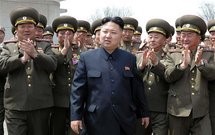 For the second time in 2013, China has voted in favour of a UN Security Council Resolution on North Korea (DPRK) that came hot on the heels of Pyongyang's latest nuclear test. Resolution 2094 is the fifth in a series of sanctions - 2006, 2009, 2012, and January 2013 - which have sought to take the fight ever closer to the ‘rogue's' doorstep. North Korea, meanwhile, continues to threaten the US and South Korea with a nuclear first strike, ostensibly heedless of China signalling the hard times ahead.
For the second time in 2013, China has voted in favour of a UN Security Council Resolution on North Korea (DPRK) that came hot on the heels of Pyongyang's latest nuclear test. Resolution 2094 is the fifth in a series of sanctions - 2006, 2009, 2012, and January 2013 - which have sought to take the fight ever closer to the ‘rogue's' doorstep. North Korea, meanwhile, continues to threaten the US and South Korea with a nuclear first strike, ostensibly heedless of China signalling the hard times ahead.
Being the only state advocating a moderate line on North Korea for long, China has lately been under pressure to come down on its lone ideological ally. What impact will its support for harsher sanctions have on North Korea? Can China address its long standing core concerns on the matter? Is there a possibility of a paradigm shift in Beijing's strategy vis-a-vis Pyongyang?
Tightening Screws
The new sanctions target North Korea's channels of sourcing technological equipment and financial resources for its clandestine uranium enrichment and ballistic missile development programmes. The UNSC resolution gives an extended mandate to other states to intercept, detain, inspect, and seize North Korean shipping assets carrying suspect cargo.
More importantly, the sanctions seek to block the DPRK regime's bulk cash transfers, illicit activities, and freeze its ties with international banking systems. North Korean diplomats, organisations, and companies will be put under the scanner too. Other states have been banned from exporting luxury and capital goods into North Korea to sting the ruling elite where it hurts.
The implications of China co-drafting and endorsing the resolution could be hard-hitting. China accounts for the lion's share of North Korea's trade with the outside world. Many of its companies are already holding off consignments to the DPRK for the fear of being seized and blacklisted. Chinese port facilities would now be increasingly hostile to North Korean shipments given the added commitments to be extra vigilant and intrusive.
Principal Contradictions
The reasons why China has politically and economically sustained the state in North Korea are multi-pronged. Primarily, keeping Pyongyang on its payroll has helped Beijing maintain an efficient security buffer which not only diverts the antagonism reserved for authoritarian Communist regimes but also keeps Japan and South Korea, both eminent global economies and US allies, ensnared at the very least.
It is also of Beijing’s concern not to let the DPRK regime collapse, a possible trigger for reunification of the Koreas, with possibly devastating consequences for China’s political and military clout in Northeast Asia. Not only will it cause millions of refugees to cross over into China but also allow a sudden spike in the US military presence reaching right up to China’s land borders. The worst-case scenario could be a nuclear exchange with impermissible fallout for China’s densely populated and economically vital eastern coast.
China’s recent actions are, presumably, indicative of Beijing’s growing misgivings and frustration with the DPRK’s abrasive behaviour. Chinese government officials along with analysts have publicly spoken out against unconditionally supporting a ‘suicidal’ neighbour. But the message targets the international community more than Kim Jong-un, the new supreme leader in North Korea, presently pulling out all stops to gain the same global notoriety his father and predecessor, Kim Jong-il, enjoyed.
China cannot ensure against the threats to its security by pushing the hard-line against North Korea too far. The fresh openness in the Chinese establishment towards its North Korea policy and decisive multilateral actions such as the recent UNSC vote need not necessarily augur a sea change from past dealings. Beijing’s current posture provides a tempering counterbalance to Pyongyang’s hell-raising. By extension, the reason why North Korea is not willing to behave is that it does not really have to.
An Unlikely Second Front
This goes on to highlight the way the Chinese perceive and react to the situation. The DPRK does not bother with good governance or amicable foreign relations. It is a dynastic military dictatorship with a narrow set of survival skills and means. Kim Jong-il ruled North Korea for over fifteen years in the face of worldwide condemnation. Kim Jong-un must employ desperate measures before his rule begins to appear weak. When the dust settles, the new leader hopes to emerge as unrelenting in the face of pressure and punishment.
The onset of a paradigm shift in Chinese strategy would ultimately have to be weighed against the gains of having an institutionally socialized, even democratized, North Korea. That outcome is precluded by the possibility of multiple crises which could open a can of worms for the whole region. But it does not hurt China to help legally restrain a government that has thrived very well on illegal means of income and trade all along.
China could well be tapped by the US for devising and reaching a more meaningful compromise with North Korea at a time when Beijing seems to show a better understanding of the threat to regional security. However, to expect a dramatic step towards resolution of the Korean crisis out of China’s joining the international consensus is a long shot. It seems likelier at the moment that Pyongyang should soon comfortably settle for a refreshed image of unrepentant evil unless, as before, another profitable peace deal comes through.
Courtesy : Institute of Peace and Conflict Studies (http://www.ipcs.org)